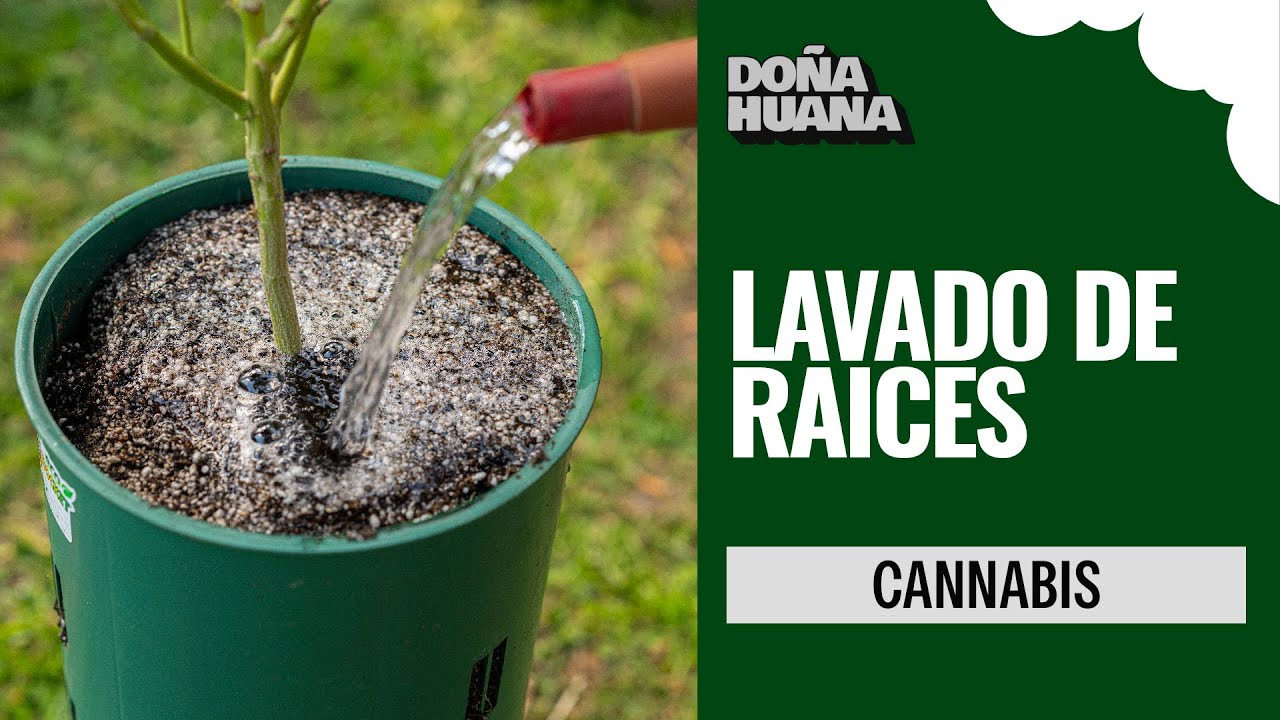What Is Flushing and Why Is It Important in Cannabis Cultivation?
Flushing is a crucial process in cannabis cultivation that involves the reduction of salts and nutrients accumulated in the substrate before harvest. This procedure is usually done in the last weeks of the flowering phase and aims to prepare the plant for a harvest of higher quality and freshness. During flushing, plants are watered with pure water, allowing the root system to remove excess nutrients that could affect the taste and smoothness of the final product.
Why is flushing important?
Flushing is essential for several reasons:
- Improves Flavor: By removing nutrient residues, cannabis is prevented from having a chemical taste and its natural flavor is highlighted.
- Increases quality: Flowers that have been properly washed usually have a higher quality in terms of aroma and therapeutic potential.
- Prevents health problems: Excessive salt accumulation can lead to problems in the plant, such as stress and diseases.
- Makes harvesting easier: Clean plants are easier to work with and process, which improves efficiency in production.
This process not only benefits the grower in terms of product quality, but can also result in a better economic return. Medical and recreational cannabis users are increasingly valuing the quality and purity of the product they consume, making flushing a recommended practice and increasingly common among growers aware of the importance of their plants’ health.
Benefits of Flushing: From the Taste to Health of Your Plants
Flushing is an essential technique in cannabis cultivation that can improve both the taste and overall health of your plants. This process consists of rinsing the substrate with clean water, thus removing excess nutrients and accumulated salts. This way, the plants have the opportunity to absorb only the essential elements, resulting in a higher quality end product.
Flavor Enhancement
One of the most prominent benefits of flushing is the improvement in the final flavor of the flowers. When plants are watered with clean water, the bitter and chemical tastes that can result from excessive fertilizers are eliminated. This allows the natural characteristics of the plant’s genetics to be fully expressed, resulting in a cleaner and more pleasant flavor profile.
Plant Health
In addition to flavor, flushing has a significant impact on the overall health of plants. By performing an effective rinse, problems such as nutrient toxicity, which can weaken the roots and promote the appearance of diseases, are prevented. A well-hydrated plant free of nutritional excesses is more resistant to pests and diseases, which ensures a more abundant and healthy harvest.
- Removal of accumulated salts: Prevents the accumulation of salts that can cause damage to the roots.
- Growth stimulation: Clean roots can absorb nutrients more efficiently, promoting healthy growth.
- Stress reduction: Minimizes the risk of water stress, increasing the vital health of the plant during its life cycle.
Methodology of the Root Washing Study: Procedure and Key Results
The methodology employed in this study on flushing focuses on a series of structured steps that ensure the validity and reproducibility of the results. First, a variety of cannabis strains were selected, ensuring a representative sample that included both THC and CBD-rich strains. This approach allows us to observe how the washing technique affects different cannabinoid and terpene profiles.
Flushing Procedure
The root flushing procedure was performed in several stages:
- Initial Preparation: The plants were carefully watered in the days prior to washing to reduce the accumulation of salts in the substrate.
- Washing Technique: An irrigation system with distilled water was used, where the roots were rinsed and aerated for a period of 24 to 48 hours.
- Data Collection: Samples were taken before and after washing to analyze the concentration of nutrients and contaminants in the substrate.
Key Results
The results of the study revealed significant changes in the composition of the substrate after washing. A 50% reduction in toxic salt levels was observed, indicating effective removal of contaminants. In addition, the concentration of terpenes and cannabinoids in the washed flowers showed a noticeable increase, suggesting that this technique could improve the quality of the final product.
Study Results: Impact of Flushing on Medical Cannabis Quality
Flushing is a fundamental process in the cultivation of medical cannabis, which consists of irrigating the plants with clean and pure water to remove nutrients and salts accumulated in the substrate. Several studies have shown that this procedure can have a significant impact on the final quality of the product. The most relevant results of the study carried out on this topic are presented below.
Effects on Terpene Profile
The study revealed that proper flushing improves the terpene profile present in cannabis flowers. A notable increase in the intensity of aromas and flavors was observed, which translates into a more pleasant experience for the user. Terpenes are volatile compounds responsible not only for the aroma, but also for the therapeutic effects of cannabis.
Cannabinoid Concentration
- Increased THC: Samples that went through effective washing showed an increase in the concentration of tetrahydrocannabinol (THC).
- Chlorophyll Reduction: Flushing also contributed to a decrease in chlorophyll, resulting in a purer and more attractively colored end product.
- Impact on Minor Cannabinoids: Cannabinoids such as CBD and CBN also benefited from proper washing, showing better results in lab tests.
The results suggest that medical cannabis growers should seriously consider implementing flushing as part of their harvesting process, as it not only improves the quality of the final product, but also enhances the therapeutic effects of cannabis for patients who depend on it.
Conclusions and Recommendations: Optimize Your Crops with Flushing
Flushing is an essential technique for any cannabis grower looking to maximize the quality and yield of their plants. By removing excess nutrients and accumulated salts, the absorption of water and essential minerals is facilitated, resulting in healthier plants and a purer flavor in the final product. In addition, this process can help prevent problems such as nutrient stress and improve the plants’ resistance to pests and diseases.
Recommendations for Effective Money Laundering
- Adequate time: Flush the roots about a week or two before harvest.
- pH Adjustment: Make sure that the water used for washing has a pH balanced between 6.0 and 7.0.
- Frequency: Don’t hesitate to do an extra wash if you notice symptoms of nutrient buildup, such as spots on the leaves.
The use of distilled or filtered water can enhance the results of the wash, as it eliminates the possibility of introducing new impurities into the soil. Remember that while flushing can be very beneficial, it’s vital not to overstep its limits, as excessive flushing can lead to nutrient deficiency in plants. Implementing this technique with care and attention to detail can take your crops to a new level of excellence.


